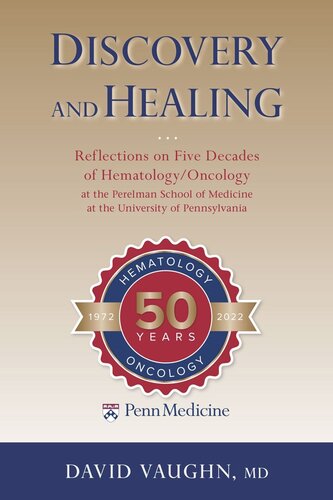

Most ebook files are in PDF format, so you can easily read them using various software such as Foxit Reader or directly on the Google Chrome browser.
Some ebook files are released by publishers in other formats such as .awz, .mobi, .epub, .fb2, etc. You may need to install specific software to read these formats on mobile/PC, such as Calibre.
Please read the tutorial at this link: https://ebookbell.com/faq
We offer FREE conversion to the popular formats you request; however, this may take some time. Therefore, right after payment, please email us, and we will try to provide the service as quickly as possible.
For some exceptional file formats or broken links (if any), please refrain from opening any disputes. Instead, email us first, and we will try to assist within a maximum of 6 hours.
EbookBell Team

4.7
66 reviewsIn Discovery and Healing: Reflections on Five Decades of Hematology/Oncology at the Perelman School of Medicine at the University of Pennsylvania, David Vaughn describes the history of the Perelman School of Medicine's Division of Hematology/Oncology. Vaughn knows the subject well: he trained in the Division's Hematology/Oncology fellowship program from 1990 -1993 and has been on the faculty of the Division since 1993.
Since its founding in 1972, the Division of Hematology/Oncology at the Perelman School of Medicine at the University of Pennsylvania has made important contributions to the fields of blood disorders and cancer medicine. Based largely on his personal experience and extensive interviews with former and present faculty, Vaughn describes the evolution of the Division from a small group of research hematologists to a comprehensive program of fundamental and translational researchers and clinical specialists in benign and malignant hematology and solid tumor oncology. He highlights the importance of leadership as he examines the successes of each of the four Division chiefs: Richard "Buz" Cooper, Sanford Shattil, Stephen Emerson, and Lynn Schuchter. He describes the lasting impact that the Division's first oncologist, John Glick, has had on the Division, the Abramson Cancer Center, and the author himself. He emphasizes the important role that philanthropy has played in the Division's achievements. He concludes the account by reflecting on the Division's experience and call to action as it confronted the COVID-19 pandemic.
Both a memoir and a historical account, Vaughn's book demonstrates the good that can be accomplished when an innovative and dedicated medical faculty are committed to discovery and healing.